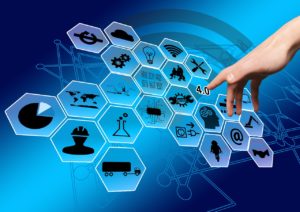Flying high with IoT
The revolution of technologies can’t be longer stopped as everyone already enjoys a lot of advantages from it. Today’s generation processes information from technological devices five times faster than older generations and like it or not, they will be emerging target market whose demand has to be satisfied in the coming years. It’s happening in countries throughout the world that it has drained a lot of attention from government, companies and other stakeholders.
Today, a lot of researchers claim the positive impact of Internet of Things (IoT), which is basically a computing concept of connecting any physical objects around us to the internet and able to identify themselves to other devices. IoT has been claimed to meet demand of future generation, bring a lot of potential benefits to investor and government. Accenture estimated the potential economic value for industrial IoT will be able to reach $15 trillion by 2030 globally and moreover. Oxford economists revealed that industrial IoT represent about 62% of gross domestic product to G20 nations. Many countries are running with IoT. In February 2016, Indonesian President, Joko widodo, introduced a venture capital policy of financial incentive for technology startups and Jakarta smart city has been master plan. While China has pushed global internet of things standard since their annual IoT development report revealed that market size of China’s IoT industry will be more than 1.5 trillion yuan ($231.4 billion) in 2020.
 The application of IoT is so wide to the point that it can change human life, people can live securely and comfortably in smart house with censor devices that allow them to control everything by their own voice only, security system that will automatically responds to prevent burglars breaking into our house, in case of smart cities, it can help to minimize pollution and congestion problem. Censors put on traffic lamps and surveillance cameras allow lamp to turn on only when people pass by, which will save a lot of energy. By transferring data from the field to our car’s GPS system, we can save more time finding a parking space, even now IoT allows automotive industries to produce self-driving car that was just our dream a long time ago.
The application of IoT is so wide to the point that it can change human life, people can live securely and comfortably in smart house with censor devices that allow them to control everything by their own voice only, security system that will automatically responds to prevent burglars breaking into our house, in case of smart cities, it can help to minimize pollution and congestion problem. Censors put on traffic lamps and surveillance cameras allow lamp to turn on only when people pass by, which will save a lot of energy. By transferring data from the field to our car’s GPS system, we can save more time finding a parking space, even now IoT allows automotive industries to produce self-driving car that was just our dream a long time ago.
It changes everything in the way we live, Science and Technology Options Assessment Panel (STOA) of the European Parliament estimated that by 2050, a robot will help us with household chores, become our friend or labor in factory. This revolution of industry will soon or later becomes true because IoT is promising for efficiency and sustainability. It can minimize human error, replacing time-wasting, work poor performance, accident potential and limited power of human being by stable productivity which will lower cost of production and energy use at the end. The precision of robot can be very beneficial for mass production which needs standardization and accuracy.
IoT will not work without data, every time we use phones, buses, enter libraries, GPS’, search engines and other activities, all these actions will be stored by the system, so we are the data not others. Thus marketers will be very busy to analyse data obtained from the system. Therefore the transformation from traditional market research to big data will not be avoided. IoT will produce a lot of information about our behavior that will be useful for marketing strategy formulation and city management.
 On the other side, there are other things to consider and prepare regarding the era of IoT. Indeed many people will lose their job, because the use of robot will downsize employees, only IT related jobs will grow. But it is not the only implication, robot can’t have creativity just like human beings, thus it will decrease opportunity of new ideas toward product from labor.
On the other side, there are other things to consider and prepare regarding the era of IoT. Indeed many people will lose their job, because the use of robot will downsize employees, only IT related jobs will grow. But it is not the only implication, robot can’t have creativity just like human beings, thus it will decrease opportunity of new ideas toward product from labor.
Cyber privacy will also be primary concern at that time. Every data about us will be stored in home security system which also becomes perfect information for thieves to know when you are not at home. Automatic cars will not guarantee us 100 percent safe from malfunction or cyber terrorism which also will become instant death to us when we can’t control our own technology. Cheaper mass production has been predicted by the STOA will change our shopping behaviour, we will be less attached to our products that will drive more consumption and finally it will also generate more waste, at that time technology will also potentially harm environment. Security will also be concern when human has to be paired with robot at work, if the system failures then robot can’t be responsible for the accident. Moreover, technology can also badly impacts to our social skills, it is obviously clear that online chat trends today has made us lazier to communicate with others in the real psychical world, hacked accounts can harm reputation of the original owner and even worse lead him to frustration and real life threat.
At the end, everything will bring both positive and negative consequences, so let’s see both sides. There is no reason to stop technology, but there is also no reason not to prepare the ethic codes and strong supervisory toward the use of it and be prepared for how to deal with the worst consequences in case it happens in the future.



